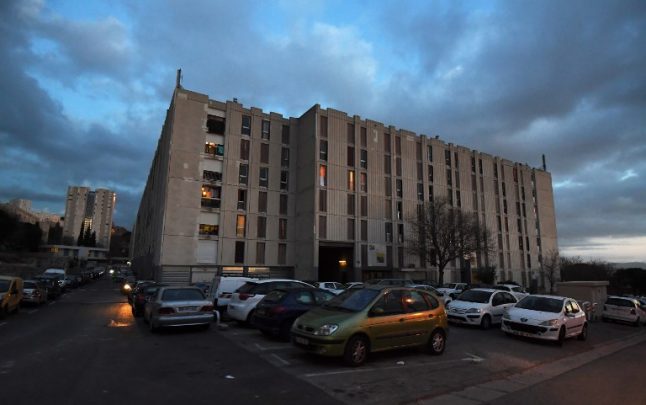DRUGS
French police bust major Marseille drug ring
French police said Friday that they had smashed a major drug trafficking ring in the southern city of Marseille, a key hub in the trans-Mediterranean cannabis and cocaine trade where several people are killed each year in turf wars.
Published: 22 June 2018 16:46 CEST

General view taken of the Cite de la Castellane housing project where the drug trafficking ring was based. Photo: AFP
Eight people were taken into custody following Monday's raid in the notorious Castellane housing estate, the nexus of the city's drug trade, regional police chief Eric Arella said at a press conference.
Around 250 officers took part in the operation, which netted 200 kilogrammes of cannabis resin and nine weapons, including two AK-47 assault rifles, as well as a grenade, two bullet-proof vests and 30,000 euros in cash.
Around 20 people accused of having various roles in the drugs business, from lookouts to “nannies” (a person in charge of hiding drugs) to a ringleader, were arrested.
Eight were charged with drug smuggling, criminal conspiracy and weapons offences and placed in preventive custody, Marseille's public prosecutor
Xavier Tarabeux said.
READ ALSO:
Arella said around 900 drug deals worth 40,000 to 50,000 euros ($46,000-$58,000) take place daily in Castellane, an estate of tower blocks home to 7,000 people famous for producing football legend Zinedine Zidane.
One of the eight suspects is a syndicate leader, Arella added.
Two are fugitives from justice who had been sentenced to jail time for drug smuggling late last year, Tarabeux added.
'See you soon'
During the raid police took a picture of a hut where deals were conducted and where marijuana prices were listed on a sign, with the message “Enjoy smoking up and see you soon!”
The arrests come two weeks after a young man was gunned down on a Saturday night in Marseille's scenic Old Port, the latest victim of the city's drug
wars which have been blamed for 12 deadly shootings so far this year, nearly as much as in all of 2017.
In a sign of the brazenness of the city's gangs, a group of around 10 gunmen travelling by car besieged a rundown housing estate in the city's north on a recent weekday afternoon.
The attackers, who wore balaclavas, fired into the air with AK-47s next to a social centre and then aimed at police while making their getaway.
A video of the incident, which a resident caught on camera, went viral on social media, prompting an outcry over the sense of lawlessness and absence of the state in Marseille.
On a visit to the city the following day President Emmanuel Macron expressed concern over the violence and pledged to come up with a national plan to combat drug trafficking by July.
Url copied to clipboard!


 Please whitelist us to continue reading.
Please whitelist us to continue reading.
Member comments